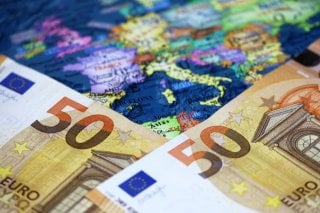Why One Italian Port Is Central to Indo-Pacific Competition
Trieste’s geographical and geopolitical advantages, rich history, and cultural diversity position it as the preeminent European gateway to the Indo-Pacific and the engine driving IMEC.
Trieste, the Italian port city at the head of the Adriatic Sea, is a pivotal link in Europe’s commercial and economic outreach toward the Indo-Pacific region. Historically serving as the Austro-Hungarian Empire’s maritime gateway, Trieste’s proximity to major European cities like Vienna, Munich, and Milan, along with its unparalleled access to Europe’s industrial heartland of northern Italy, Germany, Switzerland, Austria, and parts of Eastern Europe, positions it as Europe’s prime entrepôt for eastern trade. This strategic significance makes the city essential to anchoring the India-Middle East-Europe Economic Corridor (IMEC), unveiled at the 2023 G20 Summit in India. Already handling approximately seventy percent of Turkish imports to Europe, Trieste could be as pivotal to Europe’s trade with the Indo-Pacific as Rotterdam is to the Atlantic, enhancing the interests of the United States, Europe, and Indo-Pacific nations alike.
Trieste’s newfound importance owes much to recent history. In 2019, Zeno D’Agostino, the then-president of the Port of Trieste, was visited by the then-U.S. ambassador to Italy, Lewis Eisenberg. D’Agostino, having just returned from Shanghai, where he signed a Memorandum of Understanding with a Chinese company to upgrade, found the American ambassador wanted to know exactly what he thought China could bring to Trieste. By 2022, D’Agostino’s leadership and vision saw him elected president of the European Sea Ports Authority. With Italy’s recent departure from China’s Belt and Road Initiative (BRI), 2024 offers a timely opportunity for Trieste to enhance partnerships with the United States and all major Indo-Pacific nations, especially India, which is central to IMEC.
The initiative, a collective endeavor by the United States, the European Union, Italy, Germany, France, India, the UAE, and Saudi Arabia, represents a strategic counter to the BRI. It aims to connect the Indo-Pacific to the Mediterranean-Atlantic without a dominating national influence, emphasizing the mutual interests of its signatories. This and other geopolitical currents are pushing Trieste’s transformation from the Italian “la città in fondo a destra” (“the city at the end on the right,” referring to its remote location) to the “mercato globale mediterraneo” (the “Mediterranean global marketplace”).
Moreover, Trieste’s cultural mosaic, a blend of Italian, Croatian, Slovenian, Austro-German, and Greece influences, alongside its status as a “city of science” (with over thirty research institutions, boasting the highest density of researchers in the continent), showcases its unique status as a bridge between continents and cultures. The city’s film festival, which even holds a popular “When East Meets West” forum for movie producers and industry professionals, further exemplifies its role in fostering global connections. It is truly the most fitting place to be the European gateway to the Indo-Pacific.
The resurgence of Trieste as Europe’s southern gateway is central to bolstering economic growth and prosperity across the regions and countering Chinese dominance of global supply chains. Thus, the United States, India, Italy, and the European Union are called upon to undertake substantive and symbolic actions to maximize Trieste’s potential as the Mediterranean entrepôt to the Indo-Pacific.
To that end, Italy’s presidency of the G7 this year is pivotal in cementing and advancing the Trieste-Monfalcone area as the fulcrum of Europe’s pivot to the Indo-Pacific.
First, Italy, in close accord with the European Union, should modernize road and rail infrastructure to better connect Trieste with Central and Eastern Europe. More broadly, European security and economic well-being call for strategic infrastructure projects connecting the Adriatic with the Baltic and Black Seas, ultimately aiming to link the strategic ports of Trieste, Gdansk, and Constanța. To that end, Italy should become a member or partner/observer nation of the Three Seas Initiative.
Second, Italy’s government should undertake all necessary policy actions—including applying national and local tax incentives and zoning concessions—to make Trieste an irresistible investment destination. It should also consider promoting the country’s national shipbuilding industry based in Trieste-Monfalcone to meet the growing needs of the defense and commercial fleets for Italy and its partners.
Third, Rome should champion a Trieste Investment Forum in close collaboration with American, European, Middle Eastern, and Indo-Pacific partners.
The United States, recognizing Trieste’s strategic role in linking Europe to the Indo-Pacific, has a vested interest in supporting Italy as a robust strategic defense and economic partner. Washington could help by supporting Trieste’s special status in multilateral organizations like the G7 or NATO. Furthermore, Washington could mobilize the U.S.-EU Trade and Technology Council to apportion complementary financial support toward Trieste’s resurgence. Similarly, as IMEC’s champion and its Indo-Pacific anchor, India holds a particular interest in identifying and bolstering the most advantageously positioned European port. New Delhi has aggressively pursued investment in strategic ports along the IMEC, including Haifa in Israel, where it displaced Chinese interests. With Italy’s opting out of the BRI, India should intensify its engagement with and investment into Trieste, leveraging the recently inked India-Italy strategic partnership and fostering Indo-European trade. Additionally, India and Italy should consider holding an annual IMEC Business Forum hosted in alternate years by Trieste and Mumbai.
Ultimately, Trieste’s geographical and geopolitical advantages, rich history, and cultural diversity position it as the preeminent European gateway to the Indo-Pacific and the engine driving IMEC. The initiative’s success, a priority for the United States, the EU, India, and various Gulf nations, thus necessitates the resurgence of Trieste. The city—once a seaside village conquered by Caesar, made a port on Augustus’s orders, and rose to its heyday under Habsburg Empress Maria Theresa—is ready to dawn the mantle of a global maritime hub—the Mediterranean harbor to everywhere.
Kaush Arha is president of the Free & Open Indo-Pacific Forum and a nonresident senior fellow at the Atlantic Council and the Krach Institute for Tech Diplomacy at Purdue.
Paolo Messa is a nonresident senior fellow at the Atlantic Council and founder of Formiche. Follow him on X: @PaoloMessa.
Image: Shutterstock.com.

